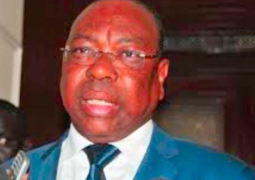
The
Insight Training Centre (ITC) and its partners, including the Gambia Prisons
Service, Ministry of Higher Education, Research Science and Technology
(MOHERST) and Ministry of the Interior yesterday held a graduation ceremony for
25 inmates at the Mile 2 state central prison.
The
ceremony was held at the Prisons headquarters in Banjul.
The
inmates were trained on electrical installation certificate level geared toward
equipping them with skills they can use to better their lives with, as they
integrate back into the society.
The
ceremony was attended by officials from the line ministries, 10 graduates out
of the 25, staff and students of Insight Training Centre, as well as families
and friends of the graduates.
Only
one of the inmates, Muhammed Darboe, is serving his sentence; and the rest are
out of prison and back in their communities.
Speaking
at the ceremony, Insight Principal Ismaila Ceesay said: “Today we are
celebrating history at the Gambia Prisons Service headquarters, because it is
the first time inmates are trained and skillfully graduating in electrical
installation.
“This
programme was jointly sponsored by PUM Netherlands senior experts and Insight
Training Centre, to the tune of D0.5 million, to train 35 inmates. This
includes training materials, salaries, and administrative cost. Today out of 35
inmates, 25 are successfully graduating.”
He
added that the collaboration with the Ministry of the Interior and the prison
authorities started in 2011, and the purpose of their collaboration is to
provide skills and knowledge to inmates before the end of their jail term, so
they will walk out of jail with some degree of skills and knowledge, which will
keep them busy and ultimately the prisons will become correction centres.
Bully
Dibba, permanent secretary of MOHERST, in his remarks on the occasion, said: “I
believe in rehabilitation through education. I will be an ardent supporter of
providing inmates with access to education, maintaining that their education
helps create safer communities, reduces tax money spent on incarcerations and
allows inmates to obtain the skills they need to rejoin communities and their
families upon release.”
He
added: “It is time for our prisons to take a common sense progressive turn and
get past this nation’s obsession with a failed and bloated criminal justice
system built on the operating principle of retribution, without recognizing the
power of redemption.
“If
we all want to improve public safety, then we must improve the rates that
propel machinery of mass incarceration. The prison and the ministry will take
significant steps to remove barriers to education for inmates.”
Anthony
G. Mendy, Director Tertiary and Higher Education, MOHERST, said it is a
laudable initiative and that the ministry is proud to be associated with.
He
said it could be remembered that staff of the ministry participated towards the
implementation of the Electrical Installation programme during its inception.
The
purpose of the project is to provide skills and knowledge for people, who for
one reason or the other, found themselves in the cells of the prisons of the
country.
The
training course was conducted on one-year practical period for a level-one
qualification, and for 35 inmates. However, 25 successfully completed the
course, which is competitive in the job market, he continued.
It
is important to recognize the important role played by the Gambia Prisons
Service and Insight Training Centre for initiating such a programme, which is
complementing the government’s effort at bringing education to the doorstep of
every Gambian.
Aziz
Jobe, one of the graduates, said they were thankful for such an opportunity,
which has equipped them with knowledge on electrical installation skills; hence
they now have something to go with to their various societies, and to better their
lives and families.
He
thanked both Insight and the Prisons service and urged all the partners and the
two institutions to continue the initiative, and extend it to other prison
centres in the country.
Oumie
Kasim Cham, chairperson of prisons visiting committee, echoed similar
sentiments.
Read Other Articles In Article (Archive)



